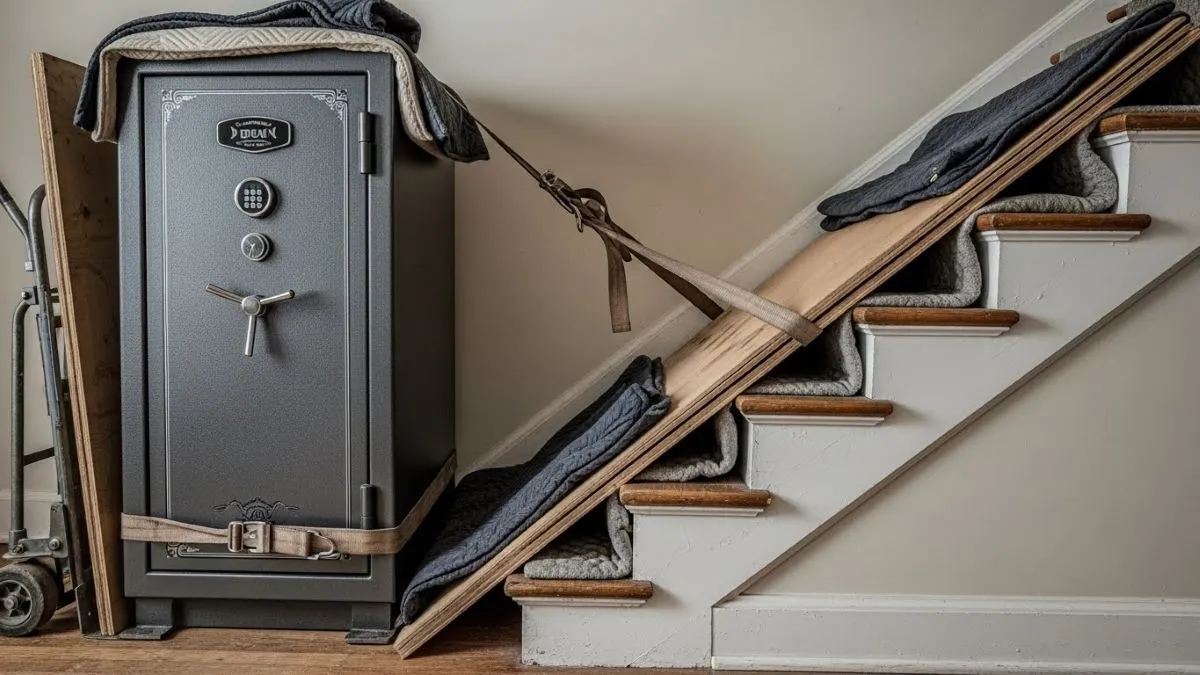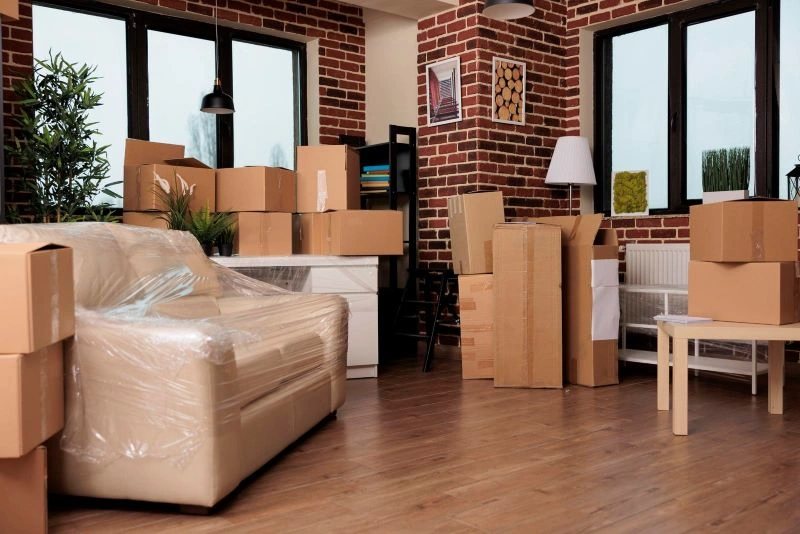How Long Does It Take to Move into a House? A Comprehensive Guide

Rassul Yeshpayev
April 15, 2025
Rassul Yeshpayev
April 15, 2025

Moving into a new house can be both exciting and overwhelming. If you're wondering how long it takes to move into a house, you're not alone. Many people find themselves asking this question as they prepare for their big day. In this guide, we’ll break down the timeline for moving, from packing and hiring movers to settling into your new home. Whether you're moving across the street or across the country, knowing what to expect can help make the process smoother and less stressful.
Key Takeaways
- The time it takes to move varies based on distance and the amount of belongings you have.
- Packing a small apartment can take 1-2 days, while larger homes may take several days.
- Creating a moving checklist can help keep you organized and on track.
- Hiring a reliable moving company can significantly reduce the time and stress involved in your move.
- Unpacking efficiently and setting up your utilities early can help you settle in quicker.
Understanding Your Moving Timeline
Moving can feel like trying to solve a really complicated puzzle. You're staring at all these pieces, wondering how they fit together and how long it's all going to take. Getting a handle on the timeline is the first step to making the whole process less stressful. It's not just about the day the truck shows up; it's about all the steps leading up to it, and what happens after. Let's break down what affects your moving timeline.
Key Factors That Influence Your Moving Timeline
So, how long does moving take? Well, it's not a one-size-fits-all answer. Several things can speed things up or slow them down. Think about it: a small apartment move is way different than moving a whole house across the country. The amount of stuff you have, the distance you're going, and even the time of year can all play a big role. For example, securing moving services during peak season can be more challenging.
Here's a quick rundown:
- Size of your home: More rooms usually mean more stuff to pack.
- Distance of the move: Moving across town is faster than moving across the country.
- Time of year: Summer is a popular moving time, so things might take longer.
- How organized you are: If you're prepared, the move will go smoother.
Typical Duration for Different Types of Moves
Okay, let's get a little more specific. Here are some rough estimates for how long different types of moves usually take. Keep in mind, these are just averages, and your actual timeline might be different.
- Local Move (within the same city): Could be as quick as a few days to a couple of weeks, depending on how much stuff you have and how much help you get.
- Long-Distance Move (across the country): Usually takes several weeks, sometimes even a month or two. This includes packing, loading, transit time, and unpacking.
- International Move: Can take several months, due to customs and shipping logistics.
How Long Does It Take to Pack a House
Packing is often the biggest time-suck when it comes to moving. It's easy to underestimate how long it will take to box up all your belongings. A good rule of thumb is to start packing way earlier than you think you need to.
I remember one move where I thought I could pack everything in a weekend. Big mistake! I ended up scrambling at the last minute, and things got pretty chaotic. Now, I always give myself at least a few weeks to pack, and it makes a huge difference.
Here's a general idea of packing times:
- Small Apartment (1-2 bedrooms): 2-5 days of packing.
- Medium House (3 bedrooms): 1-2 weeks of packing.
- Large House (4+ bedrooms): 2-4 weeks (or more) of packing.
Preparing for Your Move
Moving can feel like climbing a mountain, but with the right prep, it's more like a manageable hill. It's not just about throwing stuff in boxes; it's about setting yourself up for a smooth transition. Let's break down how to get ready.
Creating a Moving Checklist
A moving checklist is your best friend during this chaotic time. Think of it as your moving bible. It keeps you on track and prevents those "Oh no, I forgot!" moments.
Here's what your checklist should include:
- Tasks with deadlines (packing, booking movers, etc.)
- Important contacts (realtor, moving company, utility companies)
- A budget tracker to monitor expenses
A good checklist isn't just a list; it's a timeline. Start early, break down big tasks into smaller ones, and celebrate the small wins along the way. It's all about staying organized and keeping your sanity intact.
Decluttering Your Home
Before you even think about packing, declutter. Seriously, get rid of stuff. The less you move, the less you have to pack, unpack, and find a place for in your new home. It saves time, money, and stress.
Here's a simple approach:
- Go room by room.
- Sort items into categories: keep, donate, sell, trash.
- Be honest with yourself – if you haven't used it in a year, it's probably time to let it go.
Consider having a garage sale to make some extra cash or donating to a local charity. It's a win-win.
Choosing the Right Moving Company
Picking a moving company is a big deal. You're trusting them with all your worldly possessions, so do your homework. Don't just go with the first company you find.
Here's what to look for:
- Read online reviews.
- Get multiple quotes.
- Check their licensing and insurance.
Make sure they offer the services you need and that their pricing is transparent. Ask about potential extra fees. A little research now can save you a lot of headaches later. Confirm your choice of moving company well in advance to secure your moving date.
Packing Your Belongings Efficiently

Estimating Packing Time Based on Property Size
Okay, so you're staring at a house full of stuff and wondering how long this packing thing is really going to take. It's a valid question! The size of your place is a huge factor. A studio apartment? Maybe a weekend. A four-bedroom house? You're looking at potentially weeks, especially if you're trying to do it all yourself. Don't underestimate the time commitment.
Here's a super rough guide:
- Studio/1-Bedroom Apartment: 1-3 days
- 2-Bedroom Apartment/House: 3-7 days
- 3-Bedroom House: 1-2 weeks
- 4+ Bedroom House: 2+ weeks
Remember, these are just estimates. If you're a minimalist, cut those times in half. If you're a collector of things, double them. Also, consider how much time you can dedicate each day. Packing for two hours after work is different than dedicating an entire weekend.
Packing Tips for Fragile Items
Packing fragile stuff is stressful, I get it. Nobody wants to open a box full of shattered memories. The key is to over-protect. Seriously. More bubble wrap is always better. Here's my go-to strategy:
- Wrap individually: Each glass, plate, or delicate item gets its own bubble wrap cocoon. Secure with tape.
- Use packing paper: Stuff empty spaces in boxes with packing paper to prevent items from shifting. Newspaper works in a pinch, but be careful of ink transfer.
- Double box: For really precious items, put the wrapped item in a smaller box, then put that box inside a larger box with more packing material around it. It's like a box-ception of safety!
- Label clearly: Write "FRAGILE" in big, bold letters on all sides of the box. Consider adding "HANDLE WITH CARE".
- Don't overload: Keep fragile boxes on the lighter side. Heavy boxes are more likely to get dropped or crushed. Consider essential moving tips to keep in mind.
I once packed a box of delicate ornaments and labeled it "Books." You can guess what happened. The movers stacked it at the bottom of a tower of heavy boxes. Learn from my mistakes!
Organizing Your Packing Process
Organization is your best friend during a move. Trust me on this. A chaotic packing process leads to lost items, broken belongings, and a whole lot of stress. Here's how I keep things (relatively) sane:
- Pack room by room: Focus on one room at a time. This prevents items from getting mixed up and makes unpacking way easier. Start with areas you don't use often.
- Label everything: Be specific! Instead of just writing "Kitchen," write "Kitchen - Utensils" or "Kitchen - Baking Supplies." This saves so much time when unpacking.
- Create an inventory: Keep a running list of what's in each box. You can use a notebook, a spreadsheet, or even a fancy moving app. This is a lifesaver if you need to find something specific quickly.
- Keep essentials separate: Pack a box (or two) with things you'll need immediately in your new place: toiletries, medications, a change of clothes, phone chargers, etc. Label it "Open First!" and keep it with you during the move. This is especially important if you're packing a house with more space.
Executing the Move Day

Okay, so all the planning is done, the boxes are (mostly) packed, and the big day is finally here. Moving day can feel like a whirlwind, but with a little organization, you can keep things from spiraling out of control. It's all about staying calm and keeping the lines of communication open.
What to Expect on Moving Day
First off, expect things to take longer than you think. Seriously. Even with the best-laid plans, there are always little hiccups. The movers will arrive (hopefully on time!), and the first thing they'll do is usually a walkthrough to assess everything. Make sure you're there to answer any questions and point out anything fragile or that needs special attention. Keep the kids and pets out of the way – it's safer for everyone. Have some water and snacks on hand for yourself and the moving crew; it's a long day for everyone involved.
Managing the Moving Crew
Communication is key. Be clear about what goes where in the new house. Labeling boxes helps a ton, but a quick verbal confirmation never hurts. Don't be afraid to ask questions or clarify anything you're unsure about. A good moving crew will appreciate the clear direction. Also, remember they're human. Offer them water, let them take breaks, and generally treat them with respect. A little kindness goes a long way.
Final Walkthrough Before Leaving
Before you hand over the keys and say goodbye to your old place, do one last walkthrough. Check every room, closet, and cabinet to make sure nothing is left behind. This is also a good time to check for any damage that might have occurred during the move. Take photos if you see anything. Make sure all the lights are off, the doors are locked, and you've got all your important documents and valuables with you. It's a bittersweet moment, but you're on to the next chapter!
Moving day is stressful, no doubt about it. But remember why you're doing this. You're moving to a new place, a new beginning. Try to stay positive, focus on the excitement of what's to come, and don't sweat the small stuff. It'll all be worth it in the end.
Unpacking and Settling In
Moving is done, boxes are in the house... now what? Unpacking and settling in can feel like the final hurdle, but it's also your chance to really make the place your own. It's more than just emptying boxes; it's about creating a space where you feel comfortable and at home.
Unpacking Strategies for a Smooth Transition
Okay, so you're staring at a mountain of boxes. Don't panic! Here's how to make unpacking less awful:
- Start with the essentials. Pack a box (or two) of things you'll need right away: toiletries, a change of clothes, medications, phone chargers, basic tools, and some snacks. This way, you won't be digging through everything just to find a toothbrush.
- Focus on one area at a time. Don't try to unpack the whole house at once. Pick a room (maybe the bedroom or kitchen) and get it mostly done before moving on. This prevents you from feeling overwhelmed.
- Break down boxes as you go. Nothing makes a space feel cluttered faster than empty boxes. Flatten them and stash them somewhere out of the way (like the garage) for recycling.
Unpacking efficiently can really set the tone for how you feel about your new place. A little planning goes a long way in making the process less stressful and more enjoyable.
Setting Up Utilities and Services
Getting your utilities sorted is super important. You don't want to be showering in the dark or eating cold takeout for weeks. Here's a quick rundown:
- Electricity and Gas: Contact the local providers to schedule service to be turned on, ideally before you even move in.
- Water: Similar to electricity and gas, arrange for water service to be connected.
- Internet and Cable: Nobody wants to live without internet these days. Schedule installation or activation with your chosen provider.
- Trash and Recycling: Find out the schedule and procedures for trash and recycling pickup in your new neighborhood.
Making Your New House a Home
This is where the fun begins! It's about adding those personal touches that make the space feel like you.
- Hang pictures and artwork. This is an easy way to personalize your walls and bring some color into the space.
- Arrange furniture in a way that feels comfortable and functional. Don't be afraid to experiment with different layouts until you find something that works.
- Add plants. Plants can bring life and freshness to any room. Plus, they help purify the air.
It takes time to truly settle in, so be patient with yourself. Enjoy the process of making your new house a home!
Common Challenges During a Move
Moving isn't always sunshine and rainbows. Things can and do go wrong. Being prepared for these hiccups can make a huge difference in your overall experience. Let's look at some common problems and how to tackle them.
Dealing with Unexpected Delays
Delays are almost inevitable. Traffic jams, bad weather, or even a late moving crew can throw off your schedule. The key is to build some buffer time into your moving timeline. Have a backup plan for accommodation if you can't get into your new place right away. Keep essential items like toiletries and a change of clothes with you, just in case. Communication with your moving company is also important; stay in touch to get updates and adjust your plans as needed.
Managing Stress and Anxiety
Moving is a major life event, and it's normal to feel stressed or anxious. It's a lot to handle! Here are a few tips:
- Acknowledge your feelings: Don't try to bottle them up. Talk to someone you trust about how you're feeling.
- Take breaks: Step away from the packing or unpacking to do something you enjoy. Even a short walk can help clear your head.
- Stay organized: A clear plan can reduce anxiety. Use checklists and label boxes clearly.
- Get enough sleep: Easier said than done, but crucial for managing stress.
Remember to be kind to yourself during this process. It's okay to feel overwhelmed. Focus on what you can control and let go of what you can't.
Handling Last-Minute Changes
Something always seems to pop up at the last minute. Maybe your closing date gets pushed back, or a piece of furniture doesn't fit through the door. Be prepared to adapt. Have extra cash on hand for unexpected expenses. Keep important documents easily accessible. And most importantly, try to stay flexible. A positive attitude can go a long way in navigating these last-minute changes.
Post-Move Considerations
Moving is exhausting, and once the boxes are (mostly) unpacked, it's tempting to just collapse. But there are still a few important things to take care of to really settle in.
Updating Your Address
This might seem obvious, but it's easy to forget all the places that need your new address. Start with the post office to forward your mail, but don't stop there. Banks, credit card companies, subscription services, and even your doctor need to know where you've moved. Don't forget about online accounts like Amazon and any other retailers you use frequently. It's a pain, but it prevents a lot of headaches down the road. This also includes updating your driver's license and vehicle registration, which is often legally required within a certain timeframe after moving.
Exploring Your New Neighborhood
Take some time to get to know your new surroundings. This isn't just about finding the nearest grocery store (though that's important too!). It's about discovering the local gems that make your neighborhood unique.
- Walk around during different times of day to get a feel for the area.
- Check out local parks, community centers, and libraries.
- Talk to your neighbors! They're a wealth of information about the best places to eat, shop, and get things done.
Getting involved in local events and activities is a great way to meet people and feel more connected to your new community. It could be anything from a neighborhood block party to a volunteer opportunity. The more you engage, the faster you'll feel like you truly belong.
Establishing Routines in Your New Home
Moving disrupts your routines, and it can take a while to get back on track. Setting up new routines in your new home can help you feel more settled and in control. Think about your daily and weekly habits, and how you can adapt them to your new environment. Where will you have your morning coffee? Where will you work? Where will you store your essential documents? Creating a sense of normalcy will make your new house feel like home much faster.
Wrapping It Up
So, there you have it! Moving into a new house can take anywhere from a couple of days to a few weeks, depending on how much stuff you have and how far you're going. It's all about planning ahead and staying organized. Make a checklist, tackle one room at a time, and don’t forget to ask for help if you need it. Remember, every move is different, so be flexible and ready for surprises. With the right approach, you’ll be settled in and enjoying your new space before you know it!
Ready to Move? Book with BoxStar Movers
Moving doesn't have to be stressful — especially when you have the right team by your side. At BoxStar Movers, we help families and professionals move quickly and smoothly across the DMV area, including Maryland, Virginia, and Washington, DC.
✅ Fast, reliable, and affordable
✅ Local and long-distance moving experts
✅ Packing, unpacking, and storage solutions
✅ Licensed, insured, and trusted by hundreds of 5-star reviews
📅 Need a quote or want to schedule your move?
📞 (202)843-9181 or get a free quote online and let’s plan your move the right way.
Let us handle the heavy lifting — so you can settle into your new home faster.
Frequently Asked Questions
How long does it usually take to move into a new house?
Moving into a new house can take different amounts of time. If you are moving within the same city, it usually takes about one to three days. But if you are moving far away, it might take a week or more.
What things can affect how long my move will take?
Several factors can change how long your move takes. The size of your home, how far you are moving, and even the time of year can all make a difference.
How much time do I need to pack up my house?
Packing time depends on how big your house is. For a small apartment, it might take one to two days. For a larger home, it could take several days.
What should I do to get ready for my move?
To prepare for your move, create a checklist of tasks, get rid of things you don’t need, and find a good moving company.
What can I expect on moving day?
On moving day, you will need to manage the moving crew, make sure everything is loaded, and do a final check of your old home before you leave.
How can I make settling into my new home easier?
To settle in smoothly, unpack in stages, set up your utilities, and take time to make your new house feel like home.












